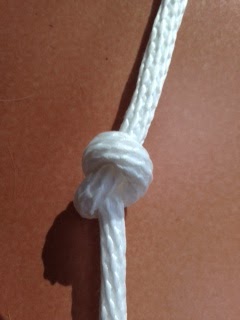"What's the best knot for attaching the jib sheets to the jib clew?" I don't know. Seriously? I've been sailing once in my life and proved myself less than a stellar crew member. I have, however, learned some essential life-lessons from sailing, like the knot.
Always tie a knot. Why? Because the sail might get out of hand, because when I release the rope I may not do a great job, and if all else fails (read I fail), then the knot at the end of the jib rope will hold the sail, even when I can't. If I let go Someone stronger and wiser will see to the righting of the ship. I didn't say it would be smooth sailing.
As a matter of fact, the captain tied the knot; the only one I knew was the simple loop it over and through ~ hardly anything that would hold in gale force winds. "The eternal God is your refuge, and underneath are the everlasting arms." Deuteronomy 33:27 I am supported, you are supported; strong loving arms are holding us when we can't hold on.
God's tender love holds us secure, like a nest for a family of birds; safety and security surround the babies as they grow and even the young are kept in their mother's care. "Even the sparrow has found herself a home, and the swallow a nest for herself, where she may have her young- near your altar, O Lord Almighty, my King and my God." Psalm 84:3, 4
Have you, "found yourself a home or a nest for yourself"?
Perhaps the arms of the Eternal God might be a good place to find shelter. One doesn't need to get to the "end of your rope" before you reach out for help. Why not let God's love be the knot that holds you no matter what seas, what storm, what trial, what temptation you face at this time. I have heard He has loving, healing hands. The One who calms the winds and the waves also knit us together in our mother's womb. He's probably a great knot-maker.
Medicine from Sacred Writings:
"If you require protection... take yourself to God, the common Protector and Savior and Benefactor of all, to that irresistible alliance, to that abiding shelter which is everywhere present, and is a wall for us on every side."
John Chrysostom Fourth Century
